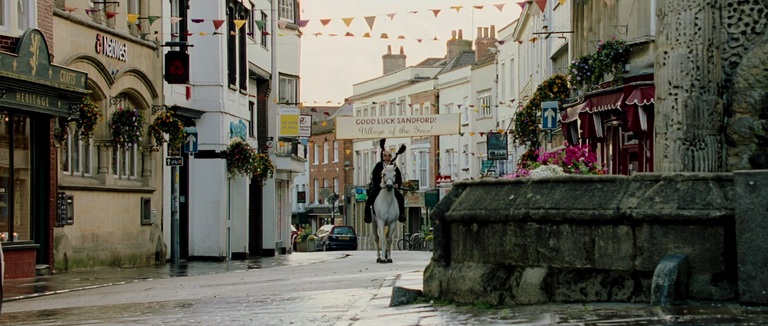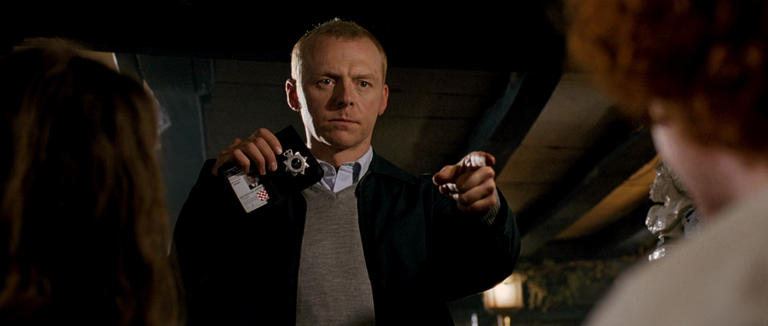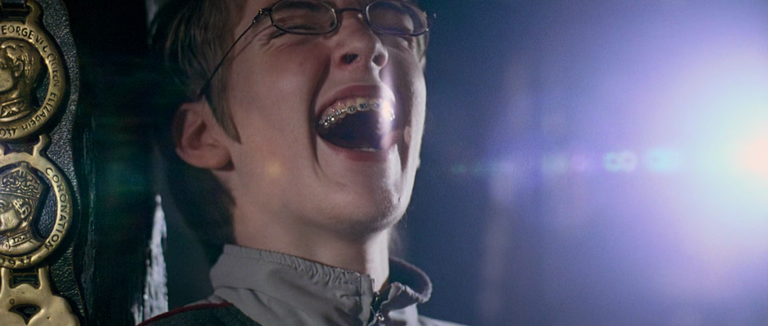
Yesterday I wrote a review on Edgar Wright's first full feature film Shaun of the Dead, detailing the aspects of culture and personal growth that were found within his comedic zombie flick that takes place within the more residential areas of London, England. With the film being such a success, it came to no surprise that Edgar Wright and many of his already well establish cast joined forces yet again under a sequel to what would be known as the 'Cornetto Trilogy'. For those who don't know: a Cornetto is just a pretty normal ice-cream that can be purchased in the UK; I assume being well enjoyed by Edgar Wright and his friends over the years enough to reference it frequently. This Cornetto trilogy of films pertaining to three particular colour themes: red for blood. Blue for police. And green for aliens. By no mere coincidence also referring to three individual flavours of the Cornetto ice-cream available for purchase in the United Kingdom.
Hot Fuzz, the second film, and blue for both police and the original chocolate and vanilla ice-cream Cornetto, with Shaun of the Dead of course referring to the Strawberry flavour, explores the chaotic life of a police officer with big numbers hailing from the city of London -- later pronounced as Lun-don by numerous characters -- as his higher-ups scheme a plan to send him far away into the countryside village of Sanford so that. Avoiding his future chaotic ways of tough crime fighting and thus the endless paperwork and drama that comes with it. Our protagonist takes his job very seriously, too seriously.
While this viewing of Hot Fuzz was by far not the first, much like Shaun of the Dead, I did discover newfound appreciation for the film watching with (somewhat more) mature eyes.

The least of locations to serve as a nightmarish, crime-ridden would be the countryside, a small town in which its majority population are going into their later years. Older individuals with small independent businesses, retired, perhaps even very much integrated into the local community. The odd sum of youth floating around but relatively harmless at a glance as one would expect of teenagers that grow up surrounded by empty fields and little to do; something I could certainly relate to in my years growing up in a village. Where the biggest even to be heard around the village was whatever boomer level gossip surrounding their very simplistic and quiet lives, or for the younger people mostly just whatever fun new location that could be turned into a swing ahead a stream, or a den made from sticks in what little wooded areas there were to be found. In regards to crime, what could there possibly be?
This is what Hot Fuzz asks as it places its protagonist into the village life far away from the chaos of a capital city. At first having to adjust to the cultural differences of village life, quieter, slower, certainly heavier on the drinking aspect as the adults flock to the local pub seemingly every night for a round of beers to unwind from the also very much relaxed day of work. Wright continues on with his directing techniques made famous as he displays fast sequences of regular actions in rapid succession to display the passing of time; contributing to both character context as we observe their actions and lives as well as serving as the connection of one scene to another. In Hot Fuzz, Wright uses these moments to display the mundane nature of a police officer's work in which the majority of time spent is on paperwork and regular detective work. Though done in a comedic manner that makes his job seem more like the action-packed Bad Boys films the characters often reference throughout the film's runtime.
Unlike Shaun of the Dead, however, is a longer runtime, larger budget, and evidently more theatrical appeal as a result. Where Shaun of the Dead feels more independent, smaller budget, Hot Fuzz is its grown-up brother with a little more construction to it. Much of its runtime contributing to a buildup of its seemingly unexpected series of events that come to a rapid conclusion that in fact does hold more references and connection to the pop culture influences Wright and his cast have looked up to long before their professional careers took off. With a theme around police work and crime comes village life comedy and crime, treated like a series of major incidents: a swan missing, petty theft, and more all while slowly introducing a series of strange deaths that appear to be accidents surrounding the village. I won't post about the narrative too much in this regard as to avoid spoilers given this is a very easy film to spoil, but I will say that it doesn't hold much weight in the grand scheme of things. Its narrative seems ignored and somewhat rushed towards the end in efforts to tie things up having spent an hour and more to joke around and poke fun at the silliness of its concept.
This is a film in which its main plot isn't that important, and the main fun comes from seeing its cast come together and just have fun. In this instance we see the strange accents of farmers in the United Kingdom which makes the location feel as if it is a totally different world to that of London, which most definitely is true. Though exaggerated a bit more for cinematic reasons. The comedy does have its moments, it will make you laugh a little, but as mentioned the narrative itself isn't all that interesting. Most likely due to this runtime given as a result of Wright being given more freedom in terms of budget but less freedom in regards to studios wanting something that pertained more to the modern blockbuster with more runtime and justification for that budget. Though with this runtime does come the interesting idea of displaying the disconnect between London and the rest of the United Kingdom, which holds some weight to it more on recent times as for many decades people have pointed out the boom of London economically with the decline of all other locations. Wright using the countryside as a location not so different to the city life is an interesting look that portrays countryside locations for what they really are: relaxed, slow, and ultimately victim to the same issues as people promote community for survival.

Hot Fuzz is a film that looks into the idea of community and the lengths ones will go to in efforts to protect it. Showing the importance community is for many; it looks at how justice is often dished out by a central authority and not necessarily following the will of the people. Ultimately who should choose what is and what is not allowed, even when the majority may disagree with it? Hot Fuzz addresses the idea of culture too, as we see the disconnect evident within the country between outsiders from the city and those who are more local in these areas. It's a very real reaction that people have, as outsiders may sometimes venture into these locations and bring alongside their city attitude; I have seen it myself, and seen the snob-like ways in which local individuals may react to it. We see the differences between two types of people despite them living within the same country; though their economic differences and ways of life very much on either side of the political spectrum.
These more countryside locations are often overlooked in the film industry within the United Kingdom. One may think of this country and imagine posh, well-spoken accents, classy individuals that live in the big beautiful city of London, most definitely aware of the most recent fashion trends, and living in a spacious and very much comfortable townhouse within the city. At a glance someone thinks of England and imagines London. Sherlock and the cobblestone streets. Big Ben and the royalty that reigns seemingly in the supposed same luxury as the citizens. Hot Fuzz shows the reality of the majority: small-town life, simple lifestyles, and a people that definitely deserve a bit more recognition.
Wright does an excellent job at shining light on small-town living. With his usual batch of talent each adding their own elements of greatness to the story. We watch Hot Fuzz for this mostly, and the rest serves as icing.

Zombie movies are really good, but I'm intrigued by the part where you mention red for blood, blue for police and green for aliens.
These movies in which the police work to perfection give me understand how complicated their role is, these days I saw a documentary of an actor in which he had to play a very important role about a chief of police, I never imagined everything he had to do to play his role very well.
My dear brother @namiks, I see that you liked this movie very much and it looks very good, of course I will see the trailer to see how it is.